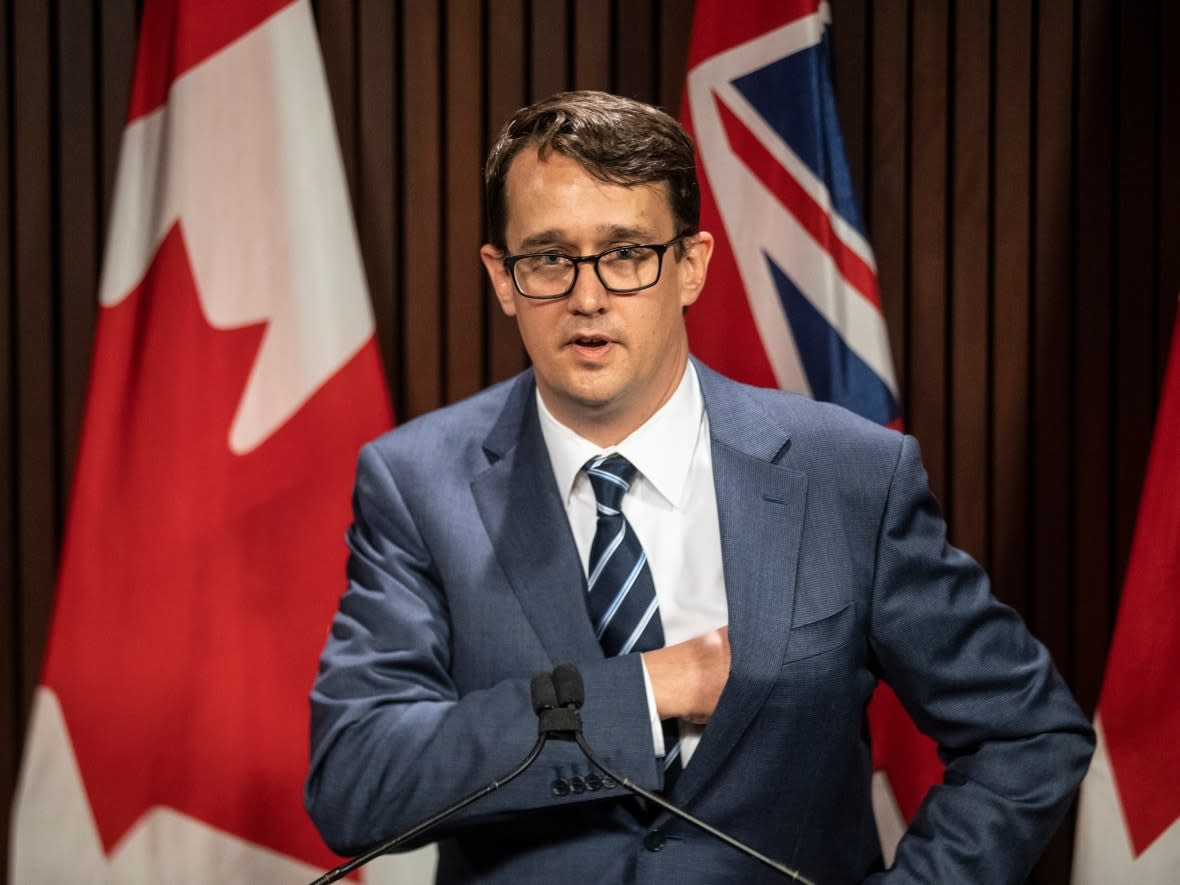Right-to-disconnect policies included in new labour legislation being introduced by Ontario government

The Ontario government is introducing new legislation that would require large employers to put in "right to disconnect" policies and bar non-compete clauses.
The legislation would require employers with 25 or more employees to develop disconnecting-from-work policies, which could include expectations about response time for emails and encouraging employees to turn on out-of-office notifications when they are not working.
Monte McNaughton, the minister of Labour, Training and Skills Development, will introduce the Working for Workers Act, 2021.
"Make no mistake, the bill supports the people or our province who work hard, put in a good shift and take pride in a job well done," McNaughton said during a media briefing on Monday.
"This is a bill that leaves no one behind."
McNaughton's legislation marks the PC party's latest appeal to workers — a key voting group in the 2022 election.
Earlier in October McNaughton unveiled new rules for temporary work agencies, including a system to shut down temp firms that violate employment standards. The government is also creating a dedicated team of inspectors to root out illegal treatment of temporary workers and recover unpaid wages. McNaughton said COVID-19 has changed the way we work, leaving too many people behind, struggling to put food on the table and make ends meet for their families.
The lines between family time and work time have been blurred. - Monte McNaughton, Minister of Labour, Training and Skills Development
He said these rules will further rebalance the scales.
"Today's proposed legislation shows Ontario is ready to lead the way into the workplaces of tomorrow, and create the conditions that will make talented, innovative people want to work in our great province." he said.
Meanwhile, McNaughton said he doesn't want Ontario to become a place where people burn out from endless work, and where family time comes last.
"This is an issue that's been really highlighted because of the pandemic," McNaughton said. "The lines between family time and work time have been blurred. I think all of us have faced challenges over the last couple of years."
Mixed reaction from opposition
Ontario's opposition parties applauded the principles behind the bill, but some expressed skepticism at the Progressive Conservative push to be on the side of workers.
"[This is] a party that's done so much damage to working people, by cancelling minimum wage increases, taking away paid sick days for them, not acting rapidly enough during the second and third waves of the pandemic to bring in legislation to support front-line workers," said Green party Leader Mike Schreiner.
"I think actions speak louder than words and I think working people in Ontario will see through the government's belated actions."
Premier Doug Ford cancelled a scheduled increase to a $15 minimum wage enacted in legislation from the previous Liberal government, which had also guaranteed workers 10 days of personal emergency days, including two paid.
Those days were replaced with three sick days, three family responsibility days, and two bereavement days, none paid. During the pandemic, the Tories introduced a temporary program of three paid sick days.
NDP Deputy Leader Sara Singh said the proposals McNaughton has announced at various news conferences are ideas her party supports, but she is concerned about what the details of the bill will say, considering the source.
"These are values of New Democrats and something we'll continue to fight for, but let's not forget, this is a government that cut the minimum wage, has taken away people's paid sick days, and hasn't been worker friendly," she said.
Liberal Leader Steven Del Duca said he's looking forward to reading the details of the bill, but he called it encouraging that the government has at least been talking lately about being more supportive of workers.
"I want to say on balance, even though it's late, even though I know a lot of Ontarians don't think it's necessarily genuine, if it's going to produce a positive outcome for workers and their families it deserves support," he said. "It has merit."
Legislation prohibits use of non-compete agreements
The proposed legislation will also prohibit employers from using non-compete agreements. These types of contracts often restrict employees from taking new jobs with another business in the same field after they leave the company.
The government said the proposed changes would ban this unfair restriction to help workers in Ontario advance their careers and earn more money.
Employers would still be able to protect their intellectual property through narrower clauses, the government said.
The legislation would also make it easier for immigrants to get licensed to work in professions that match their area of expertise, require temporary help agencies to be licensed, and require businesses to let delivery drivers use their washrooms.
Sari Abdo, co-founder and CEO of the Toronto-based start-up hungerhub, said allowing drivers and couriers to use the bathrooms on their routes directly affects his employees.
He also welcomed the work-life balance initiative, saying it is important to his company.
"We see it as a very important part of doing business," Abdo said at Monday's briefing.
Hungerhub provides meal delivery to workplaces.


